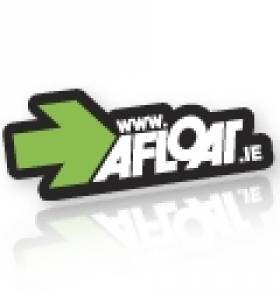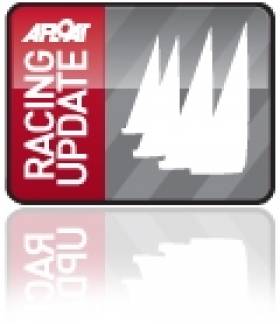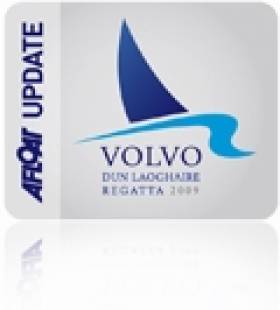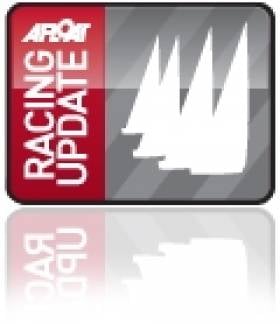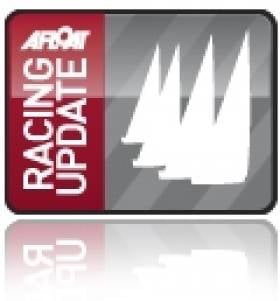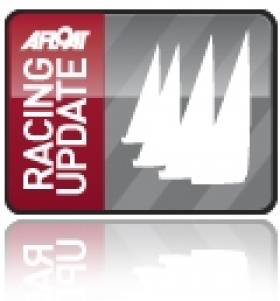Displaying items by tag: Quarter
Another Quarter Tonner Comes up for Sale
#BOATS FOR SALE – A Quarter Ton yacht for sale at €8,000 is 'a great club racer' that 'normally cleans up in Class 3', that's according to a new advertisment on Afloat's Boats for Sale site this morning. The yacht Manzanita has been 'reduced to sell' by owner George Kenefick, the recently crowned All Ireland Sailing Champion.
Earlier this month a similar yacht, a Bolero 26, Bandit, sold quickly prompting seller Ian Travers to write and record his thanks for the interest generated from the advert on the Afloat boats for sale site (cost €10).
Quarter Ton racing looks like a popular style of sailing for the current times. A leading example, Supernova took top prize at this year's Volvo Dun Laoghaire Regatta and both the 2011 ICRA Nationals and the Sovereign's Cup championed the small boat cause.
The latest addition to the boats for sale site is 'a steal for the price' says Kenefick who makes the 1977 vintage craft sound like an ideal winter project for a Dublin Bay or Cork Harbour campaign in 2012.
The boat had a new 'Formula' rig in 2006 and new mainsheet track in 2008 with new Harken cam cleats.
The boat was resprayed in 2005 but now needs a few touch ups.
All sails are from McWilliam Sailmakers. A mast head kite and a small kite are inlcuded.
The boat is lying in Hamble UK on a Trailer but you can see photos of her on the full advert here.
Kenefick's Tiger Fourth at Cowes Quarter Ton Cup
With two races completed at the end of Day 1, only 7 points separate the top 6 teams at the Coutts Quarter Ton Cup . Rob Gray's 'Aquila' holds the overall lead with a total five points, tied with Louise Morton's 'Espada' in second. Rounding out the top three just one point adrift of 'Espada' is Rickard Melander's 'Alice II', who holds a 4 point advantage over Cork's George Kenefick's fourth placed 'Tiger'. Fifth at the end of Day 1 is 'Cote' owned by Darren Marston & Ollie Ophaus.
Day 1 of the Cup dawned bright and clear but with an almost total absence of the most necessary ingredient for a sailing regatta - wind. With the glassy conditions meaning that there was very little chance of racing getting away at the scheduled 10.30 start time, Principal Race Officer Robert Lamb sensibly held the fleet ashore whilst he and his race team headed off onto the Solent in search of some sort of usable pressure. Having persevered in their quest for some several hours, Lamb and his team were eventually rewarded for their patience at around 14.00, when a pleasant 10 knot south westerly breeze materialised, enabling the eager fleet to finally put to sea for what turned out to be two excellent and closely fought races.

Tiger - Lying fourth in Cowes. Photo: Bob Bateman
Despite the wide range of sizes and designs making up the 30 boat fleet, the racing could hardly have been closer both on the water and on handicap, with every startline and mark rounding fiercely contested throughout the day. In Race 1, Louise Morton's 'Espada', (helmed at this event by Colette Blair standing in for the injured Morton) turned in a line honours performance in the first race, which was good enough to also give 'Espada' a corrected time race win by just under a minute. Second in that race was last year's Quarter Ton Cup winner 'Cote' owned by Darren Marston & Ollie Ophaus, who edged Sweden's Rickard Melander on 'Alice II' into third place by just 16 seconds on corrected time. Fourth was Rob Gray's 'Aguila', ahead of Ireland's Eamonn Rohan on Anchor Challenge.
Race 2 saw a compelling three-way battle for line honours between 'Aguila', 'Alice II' and George Kenefick's Irish entry 'Tiger'. 'Aguila' eventually prevailed to take the gun and a narrow 8 second corrected time victory over 'Tiger' in second and 'Alice II' in third. 'Espada' rounded out a solid day with a fourth place ahead of Ian Southworth's 'Whiskers'.
With two races completed at the end of Day 1, only 7 points separate the top 6 teams. Rob Gray's 'Aquila' holds the overall lead with a total five points, tied with Louise Morton's 'Espada' in second. Rounding out the top three just one point adrift of 'Espada' is Rickard Melander's 'Alice II', who holds a 4 point advantage over George Kenefick's fourth placed 'Tiger'. Fifth at the end of Day 1 is 'Cote' owned by Darren Marston & Ollie Ophaus.
As the fleet returned to the dock this evening, the smiles on the faces of the sailors was a clear indication of a fun day of Quarter Tonner racing. Having travelled from Russia to compete in Cowes this week with his French Quarter Tonner 'Bullit', Dmitry Borodin said that he had thoroughly enjoyed his first experience of racing in England. "To have the chance to sail here in Cowes is a real pleasure. There are so many fantastic boats and just being here in a town with this sort of sailing heritage is fantastic. On the water I think we have much to learn but we are enjoying our first Quarter Ton Cup and we will take the message back home with us. Hopefully in years to come there will be more Russian boats coming to sail in this regatta."
Colette Blair from 'Espada' declared herself happy with her team's first day performance. "We are fortunate that Espada performs well in all conditions, but today we seemed to be going well and we are pleased with the way we sailed." Blair also commented that Espada's only non-female crew member, mainsheet trimmer Stuart Childerley, had coped well with being the only man on-board. "It's great to sail with Stuart although I think he found the general conversation onboard today rather different to what he is used to."
Anchor Challenge's Eamonn Rohan, a first timer at the Quarter Ton Cup, had also clearly enjoyed his day on the water but was quick to pay tribute to the quality of the fleet. "This is the toughest Quarter Ton racing that we have done since we bought the boat. There are so many really fast boats and competitive crews sailing here this week, it's been a bit of an eye opener. We are having fun though and looking forward to tomorrow's racing."Despite lying in last place overall Richard Johnson & Sarah Lyle on 'Hannah J' were still amongst the most enthusiastic owners checking the results in the clubhouse after racing. "We had a great day out on the water and we are really pleased not to have finished last in the second race! Can you tell this is our first time? What we are really hoping for is an overall wooden spoon prize!" commented Sarah.
Racing at the 2011 Quarter Ton Cup continues tomorrow Tuesday 12 July with three more races scheduled. The regatta concludes on Wednesday 13 July.Sailing to Success on Supernova
She maybe old but she's still a fast one. Don't let the fact that a 33-year old local yacht took top prize from a combined fleet of 420 competitors at Ireland's biggest sailing regatta, the Volvo regatta in Dun Laoghaire yesterday.
The three sailors involved in the campaign, skipper Ken Lawless, Sybil McCormack and Pat Shannon have invested in a three year campaign to get the quarter tonner Supernova up to speed and it was only after a season of modifications last year that they found the real go button on the Dubois Starflash design.
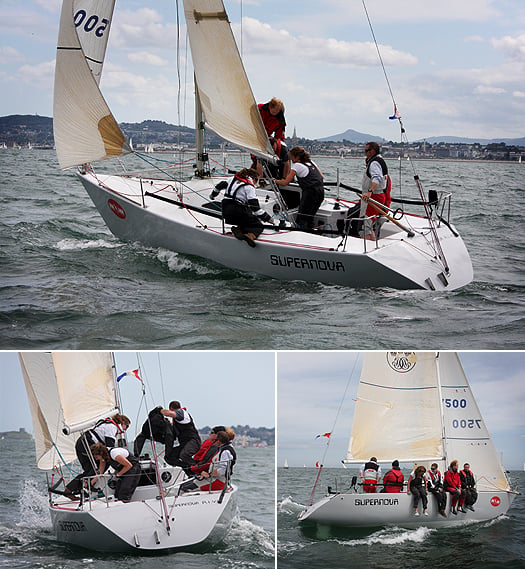
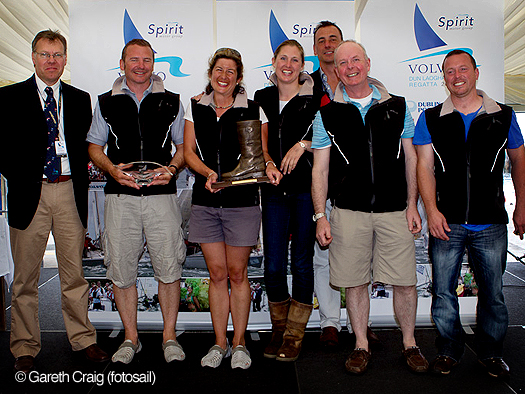
In fact, Supernova won from O'Driscoll by only the narrowest of margins and only after the third tie-break was applied to the arch rivals.
Both boats had equal points plus three wins and two second places apiece. Both had also discarded a second place and so the class, and the 2011 title, was decided on countback and who won the last race.
In a season of successes for the vintage Dubois Starflash design Dun Laoghaire sailor Lawless and his partners Sybil McCormack and Pat Shannon have already won class honours in June’s Lambay race. The quarter tonner has taken overall honours too in Dublin Bay Sailing Club's first series this season.
Part of the reason for the success has been a winter of overhauls to the 1978 design including extra downwind sail area and improved stability with the relocation of its floorboards. The improvements brought about better performances downwind, especially in light airs.
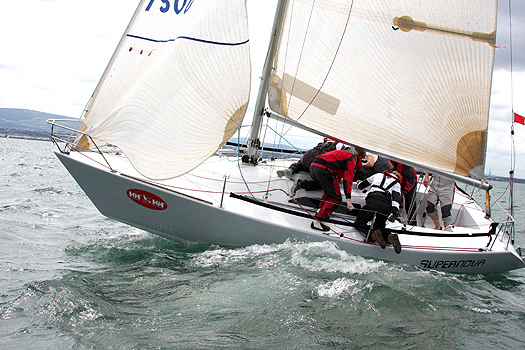
The vintage boat from the old IOR handicap days is in fact a carbon copy of the famous 1979 Admiral's Cupper two tonner Police Car, a boat that has held huge appeal for Lawless.
"We were second to Hard on Port at this regatta two years ago when they won boat of the week so there was intense rivalry today but we knew we could do it!" Lawless said last night.
Racing Round up: Dun Laoghaire Regatta, ISAF Youths, Optimists, Paralympic, RORC, WIORA, Quarter Ton, Kiteboarding.
In offshore news, the Transatlantic Race 2011 Nears a Finish, and RORC yachts that headed West did best in the St Malo from Cowes race. Ireland's entry in the Tall Ships race, Celtic Mist, is safely in Scotland. WIORA starts this week in Clifden, thirty boats are expected.
Two top Cork performers are in Cowes for this week's Quarter Ton Cup.
In other boating news, rower Siobhan McCrohan won bronze at the World Rowing Champs in Lucerne, Kiteboarding debuted in Dun Laoghaire. There were Medals for Irish Kayakers at Athens Special Olympics.
And finally after a Elaine 'Shooter' Alexander is set for hero's welcome this week as she becomes the first woman from Northern Ireland to circumnavigate the island of Ireland.
All on our home page this morning, thanks for your interest in Irish Sailing and Boating.
Second Irish Quarter Tonner Heads for Cowes
Following Monday's report on the Irish championship winning yacht Tiger (Neil Kenefick) sailing in the Quarter Ton Cup in Cowes next week a second Royal Cork Yacht, Eamonn Rohan's Quarter tonner 'Anchor Challenge' is also heading to the Solent. Her crew is made up of Eamonn, Nigel Young, Sam Hunt, Ian Travers and Mick Liddy. This boat won the event in 2009 so she has form. Watch this space!

Anchor Challenge is heading for Cowes. Photo: Bob Bateman. Scroll down for more.
Irish Champion Tiger Heading for Cowes Quarter Ton Cup
Recently crowned ICRA IRC Three Champion, Tiger (George Kenefick) is travelling to Cowes for next week's 2011 Coutts Quarter Ton Cup hosted by the Royal Corinthian Yacht Club in Cowes, and with only a week to go, anticipation is building amongst the international fleet signed up to compete.
The black hulled champion won its class at the ICRA Nationals in Crosshaven and was second in IRC a week later at the Sovereign's Cup in Kinsale. Tiger was also second in Kinsale's newly established Quarter Ton Cup. The boat is Ireland's sole entry in the event.

Cork's Tiger is heading for Cowes and next week's Quarter Ton Cup. Photo: Bob Bateman
This is the seventh running of the event since the spectacular revival of the Quarter Ton Class back in 2005, and in addition to the core of regular domestic Quarter Ton Class aficionados who flock to Cowes each year, this year entries have also been received from France and the Netherlands, as well as from as far afield as Russia and New Zealand.
Following an afternoon of registration on Sunday 10th July and the Coutts Welcome Reception at Royal Corinthian Yacht Club that evening, racing will get underway on Monday 11th July and run through until Wednesday 13th July, with three races scheduled to take place each day. Racing will be run under the IRC handicapping system, enabling boats designed to all three versions of the Quarter Ton Class rule to compete as a single fleet.


























